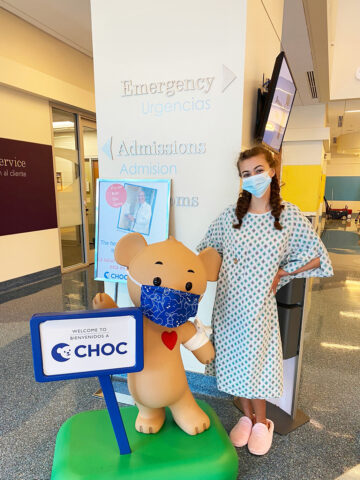Facing surgery can be a scary time for children and their parents. Dr. Ali Kavianian, M.D., surgeon-in-chief at CHOC explains what some of the most common surgeries in children are, and when to know when your child may need surgery.
Inguinal Hernia
An inguinal hernia is one of the most common conditions in infants and children, and it is usually more common in boys, according to Dr. Kavianian.
A hernia occurs when part of the abdominal organ pokes through a weak area of abdominal wall muscles. Dr. Kavianian says an inguinal hernia can be present from birth to adulthood and usually does not cause any symptoms except for a bulge in the groin or scrotum.
When the hernia content gets caught and can’t return to the abdomen, it is called incarcerated. If this happens, you should take your child to the emergency room immediately. Alarming signs include severe pain at the hernia site. Younger infants usually just cry.
If you discover a lump or bulge in or around the groin area, you should see your child’s pediatrician as soon as possible. A simple outpatient surgery by a pediatric surgeon can resolve the problem.
Appendicitis
Appendicitis occurs when the appendix, a small tubular-shaped organ that is connected to the large intestine, becomes swollen and infected. Pain usually starts in the middle of the abdomen and then moves to the right side and lower part of the abdomen. The child may develop a fever and start vomiting.
If you think your child has appendicitis, take him or her to the pediatrician or emergency room without delay. If the operation is done before the appendix is ruptured, surgery is minor. A ruptured appendix usually requires five to seven days in the hospital.
Necrotizing Fasciitis
Necrotizing fasciitis is becoming more common so parents should be aware of this serious condition. It starts with a red pimple which can be seen around the buttocks or belly and can be mistaken for a diaper rash. But, within a very short time it becomes very red, swollen, and painful, and the child will develop a fever.
If you observe such a condition, take your child to the emergency room immediately. He or she will then likely be admitted to the hospital. Good hygiene, including frequent hand washing, can reduce the risk for this infection.
Get more expert health advice delivered to your inbox monthly by subscribing to the KidsHealth newsletter here.
Learn more about CHOC’s pediatric surgery services
At CHOC, we have specialized in pediatric surgery since we welcomed our first patients in 1964. Our nationally recognized surgeons perform the latest procedures, using equipment that is customized to pediatric patients all the way from newborns to young adults.





